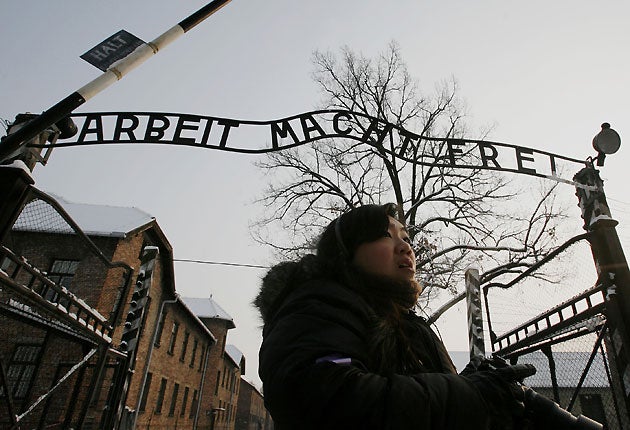Auschwitz theft 'was a professional job'
Museum director denies any of his staff were involved in stealing 'Arbeit Macht Frei' sign

Your support helps us to tell the story
From reproductive rights to climate change to Big Tech, The Independent is on the ground when the story is developing. Whether it's investigating the financials of Elon Musk's pro-Trump PAC or producing our latest documentary, 'The A Word', which shines a light on the American women fighting for reproductive rights, we know how important it is to parse out the facts from the messaging.
At such a critical moment in US history, we need reporters on the ground. Your donation allows us to keep sending journalists to speak to both sides of the story.
The Independent is trusted by Americans across the entire political spectrum. And unlike many other quality news outlets, we choose not to lock Americans out of our reporting and analysis with paywalls. We believe quality journalism should be available to everyone, paid for by those who can afford it.
Your support makes all the difference.Polish police and border guards made exhaustive checks at airports and border crossings yesterday as the search intensified for the infamous "Arbeit Macht Frei" sign stolen from the Auschwitz death camp. A reward of $39,000 has also been offered for its safe return.
The director of the Auschwitz-Birkenau memorial museum, said that none of the museum's staff are considered suspects. "I think it was done by specialists," Piotr Cywinski said. "It was a very well-prepared action."
Jaroslaw Mensfelt, a museum spokesman, said that numerous cameras were installed at the site and police were analysing the film. "We have already installed a replica sign over the gate. It has been used in the past when the original was being repaired." Security guards patrol the site around the clock, but because of its vast size they only pass by any one place at intervals, giving thieves 20 to 30 minutes to remove the 16ft sign and carry it off.
Museum authorities said they don't know how exactly much the sign weighs, but as it is made of hollow steel pipes it is believed to be somewhere between 65lbs and 90lbs, light enough for one person to lift.
There is, as yet, no hard evidence that neo-Nazis were responsible, but the theft occurred less than 48 hours after Germany announced it was donating €60m (£53m) to an endowment for Auschwitz-Birkenau, half the amount needed to preserve dilapidated barracks and the ruins of gas chambers at the former Nazi death camp.
Pawel Sawicki, another museum spokesman, said all the staff were deeply shaken by the theft. He defended the camp's security, but said no one could have imagined thieves seizing the gate's sign: "Thieves are able to robs banks and museums. Clearly this was well planned. It's a blow to our human heritage."
The Simon Wiesenthal Center, a leading Jewish human rights group, urged Poland to intensify its investigation and bring the thieves to justice. Rabbi Marvin Hier, the centre's founder and dean, said: "The 'Arbeit Macht Frei' sign has become the defining symbol of the Holocaust, because everyone knew that this was not a place where work makes you free, but it was the place where millions of men, women and children were brought for one purpose only – to be murdered."
Some 1.5 million people, mostly Jews, perished in the southern Polish death camp during the Second World War. Prisoners arriving at the camp entered via the small iron gate topped by the German-language motto. More than 500 acres of the camp became a museum after the war ended. Hundreds of thousands of people visit each year, but ticket sales are not enough to maintain the site's 155 buildings – including the gas chambers – nor its hundreds of thousands of personal items.
Polish officials plan to mark the 65th anniversary of the Soviet army's liberation of the camp on 27 January 1945 with ceremonies at the site.
Join our commenting forum
Join thought-provoking conversations, follow other Independent readers and see their replies
Comments